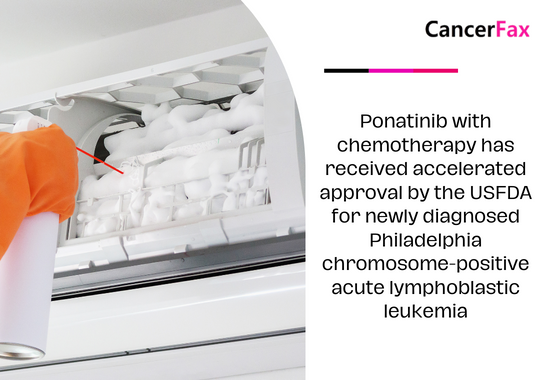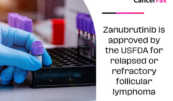Ponatinib with chemotherapy has received accelerated approval by the USFDA for newly diagnosed Philadelphia chromosome-positive acute lymphoblastic leukemia
March 2024: Ponatinib (Iclusig, Takeda Pharmaceuticals U.S.A., Inc.) has received fast approval from the Food and Drug Administration for use in combination with chemotherapy in adult patients who have recently been diagnosed with Philadelphia chromosome-positive acute lymphoblastic leukemia (Ph+ ALL).
The effectiveness of the treatment was assessed in a clinical trial called PhALLCON (NCT03589326). This experiment involved 245 adult patients who were newly diagnosed with Philadelphia chromosome-positive acute lymphoblastic leukemia (Ph+ ALL). The trial was randomized, meaning patients were assigned to different treatment groups, and it was active-controlled, meaning it compared the new treatment to an existing treatment. The trial took place at many centers and was open-label, meaning both the patients and the researchers knew which treatment each patient was receiving. Subjects were randomly assigned (2:1) to receive either ponatinib 30 mg orally once daily or imatinib 600 mg orally once daily in combination with chemotherapy (the use of imatinib with chemotherapy is not allowed). The chemotherapy treatment regimen included 3 rounds of induction therapy using vincristine and dexamethasone, followed by 6 rounds of consolidation therapy alternating between methotrexate and cytarabine, and finally 11 rounds of maintenance therapy using vincristine and prednisone. After the induction phase and achieving minimal residual disease (MRD)-negative complete remission (CR), the dosage of ponatinib was decreased to 15 mg once daily.
The effectiveness was determined by the rate of complete remission (CR) without minimal residual disease (MRD) at the conclusion of the induction phase. The rate of achieving complete remission (CR) without minimal residual disease (MRD) at the conclusion of the induction phase was 30% in the group treated with ponatinib and 12% in the group treated with imatinib. The risk difference between the two groups was 0.18 (95% confidence interval: 0.08, 0.28), with a p-value of 0.0004.
The predominant adverse effects observed were hepatic dysfunction, arthralgia, rash and related conditions, headache, pyrexia, abdominal pain, constipation, fatigue, nausea, oral mucositis, hypertension, pancreatitis/elevated lipase, peripheral neuropathy, hemorrhage, febrile neutropenia, fluid retention and edema, vomiting, paresthesia, and cardiac arrhythmias.
The suggested dosage for ponatinib is 30 mg administered orally once per day, with a reduction to 15 mg administered orally once per day after MRD-negative CR is achieved at the end of the induction period. Continue administering ponatinib in conjunction with chemotherapy for a maximum of 20 cycles, unless there is a loss of response or the presence of intolerable toxicity. To obtain information on the dosage agents used in conjunction with ponatinib, please refer to the prescribed information.
Dr. Nishant Mittal is a highly accomplished researcher with over 13 years of experience in the fields of cardiovascular biology and cancer research. His career is marked by significant contributions to stem cell biology, developmental biology, and innovative research techniques.
Research Highlights
Dr. Mittal's research has focused on several key areas:
1) Cardiovascular Development and Regeneration: He studied coronary vessel development and regeneration using zebrafish models1.
2) Cancer Biology: At Dartmouth College, he developed zebrafish models for studying tumor heterogeneity and clonal evolution in pancreatic cancer.
3) Developmental Biology: His doctoral work at Keio University involved identifying and characterizing medaka fish mutants with cardiovascular defects.
4) Stem Cell Research: He investigated the effects of folic acid on mouse embryonic stem cells and worked on cryopreservation techniques for hematopoietic stem cells.
Publications and Presentations
Dr. Mittal has authored several peer-reviewed publications in reputable journals such as Scientific Reports, Cardiovascular Research, and Disease Models & Mechanisms1. He has also presented his research at numerous international conferences, including the Stanford-Weill Cornell Cardiovascular Research Symposium and the Weinstein Cardiovascular Development Conference.
In summary, Dr. Nishant Mittal is a dedicated and accomplished researcher with a strong track record in cardiovascular and cancer biology, demonstrating expertise in various model systems and a commitment to advancing scientific knowledge through innovative research approaches.
- Comments Closed
- April 6th, 2024






Accelerated approval 2024, BCR-ABL1 inhibitors, Iclusig for Ph+ ALL, Newly diagnosed ALL therapy, Pediatric/adult ALL breakthrough, Philadelphia chromosome treatment, Ponatinib chemotherapy approval, TKI combination therapy
CancerFax is the most trusted online platform dedicated to connecting individuals facing advanced-stage cancer with groundbreaking cell therapies.
Send your medical reports and get a free analysis.
🌟 Join us in the fight against cancer! 🌟
Привет,
CancerFax — это самая надежная онлайн-платформа, призванная предоставить людям, столкнувшимся с раком на поздних стадиях, доступ к революционным клеточным методам лечения.
Отправьте свои медицинские заключения и получите бесплатный анализ.
🌟 Присоединяйтесь к нам в борьбе с раком! 🌟